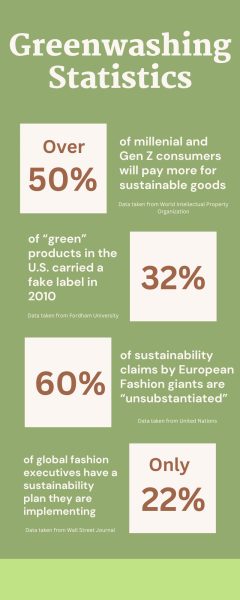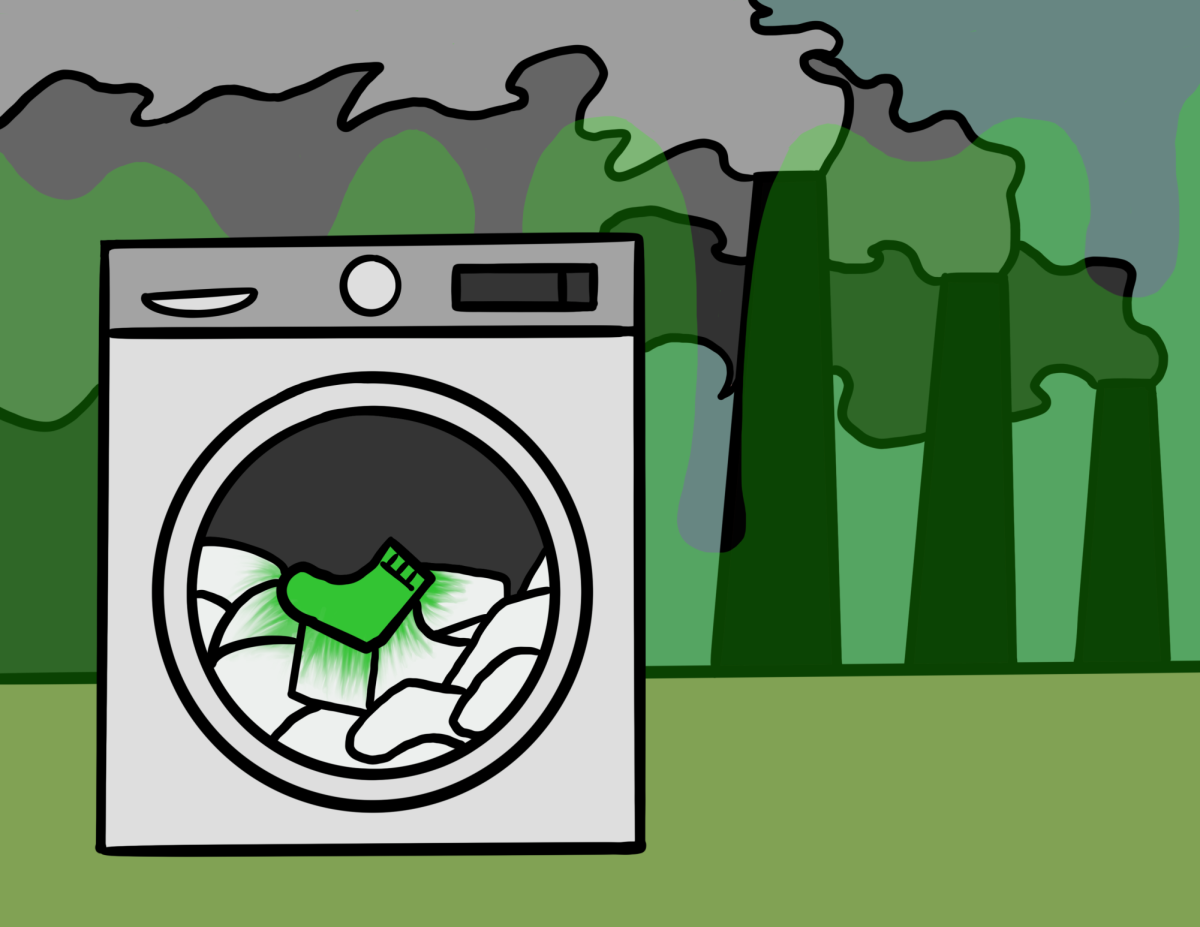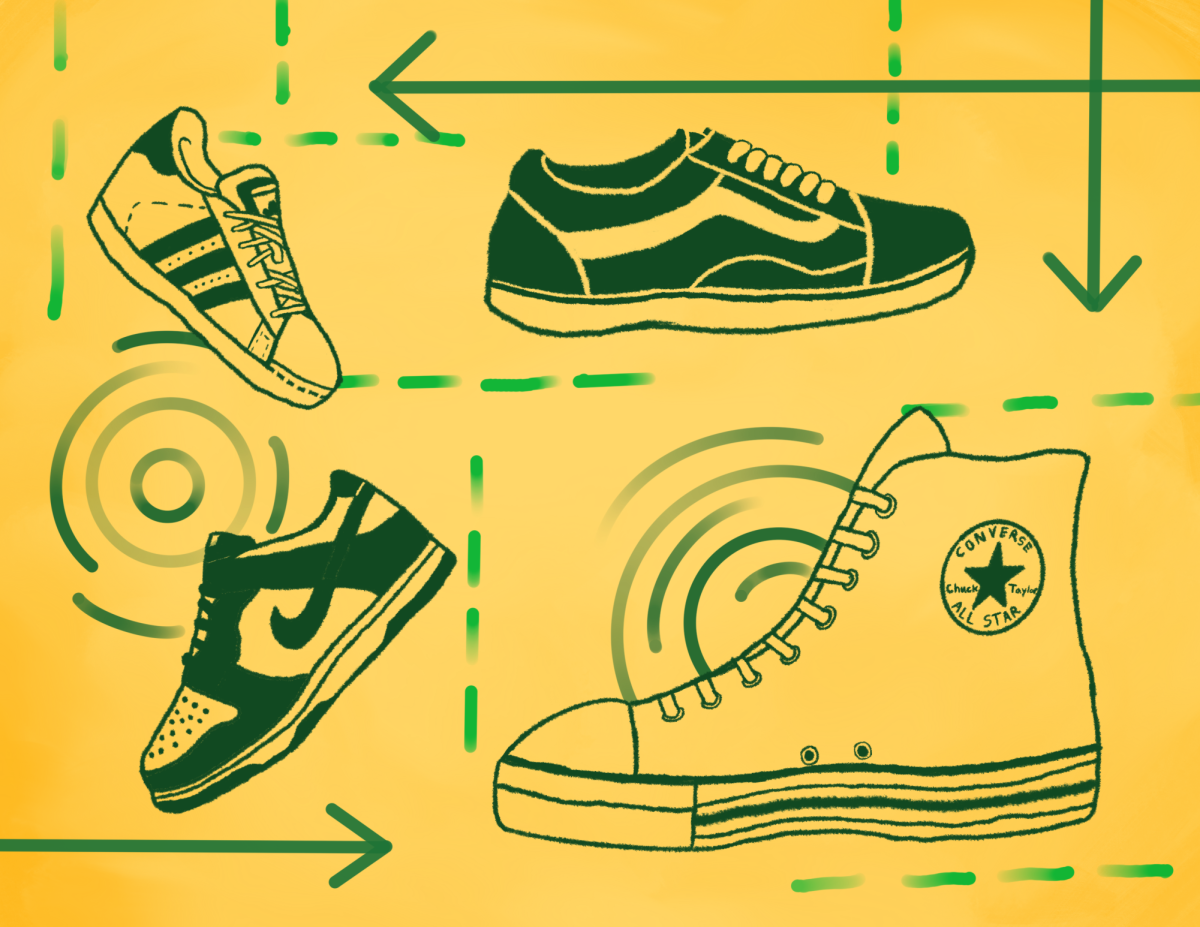“Sustainable,” “repurposed” and “recycled” are some of the words used to advertise the new collection of a teen’s favorite fashion brand. The companies claim that their new items are produced with 30% recyclable plastic, causing the teen to buy the new clothing with the feeling that they are making a sustainable decision. However, the company continues to commit unethical practices to gain money from customers who attempt to be eco-friendly.
Greenwashing is a term used to describe a company or organization that markets itself as ethical and sustainable but does not actually practice what it claims. The labels are used to distract from a product or practice’s overall environmental impact.
The term was coined by Jay Westerveld, an environmentalist who wrote an essay criticizing the contradictions of the “save the towel” movement in hotels in 1986. Hotels would tell customers to save their towels for multiple uses to protect the environment, but the act overlooked the rest of the waste hotels produced. Westerveld argued that hotels were instead using the movement to save costs on washing towels rather than helping the environment.
Companies that greenwash use similar tactics to those Westerveld claimed, marketing something as eco-friendly, which in reality does not contribute to solving environmental harm.
“I feel that these companies do not truly care about the environment but simply use statistics and false promises to receive more customers,” freshman Christina Rodrigues said.
This is especially prominent in the fast-fashion industry, where clothing brands greenwash to distract from their unethical business practices.
The fashion industry is one of the biggest polluters in the world, expelling waste such as water, energy and textiles. The U.S. Environmental Protection Agency reported that 11,300,000 tons of textile waste were landfilled in 2018.

Fast-fashion speeds up the production of clothing, quickly putting out clothing inspired by the newest trends at a cheap cost. However, these brands also tend to prioritize quantity over quality. The textiles produced are meant to only be worn for a short period of time and then thrown away, causing the fabrics to eventually pile up in landfills and take a million years to degrade.
Workers for these companies are also under inhumane conditions. The Washington Post reported on how the U.S. banned imports of cotton in Xinjiang because of allegations of forced labor. Multiple fast-fashion brands have their employees work long hours with little pay and a lack of safety. Dominic Bliss mentions in their National Geographic article the 2013 Rana Plaza garment complex collapse, which killed over 1,100 workers due to ignorance of safety and proper constructional integrity.
The push for more sustainable options and people trying to be more aware of what they are buying has caused fast-fashion brands to try to improve their images by becoming more eco-friendly. Still, a lot of them resort to greenwashing instead of actually committing to improving their sustainability.
H&M, for example, was called out in 2022 by a Quartz investigation that claimed that more than half of the scorecards they have on their clothing portrayed products as being better for the environment than they actually were. H&M took down the scorecards after Quartz confronted them.
Quartz also mentioned in the report that most of H&M’s clothing did not even have a scorecard for their environmental impact and that they use certain language to make the data appear more in the brand’s favor.
For teens trying to make environmentally friendly choices, greenwashing is an important factor in deciding what brands to choose from. Choosing an unethical brand can leave them upset and defeat the purpose of looking to shop sustainably in the first place.
“I would have searched for a sustainable piece of clothing to support the cause and because I believe in it. I would feel angered that I was deceived,” sophomore Emily Balk said.
Greenwashing makes it difficult for people to tell the difference between actual sustainable brands and false marketing. The brands pose to seem like all the rest, when in reality they are targeting a specific group of people to include in their potential customers. Other times, people may not have the time or feel the need to look into the brands, possibly resulting in them unintentionally buying greenwashed fashion.
“I probably have [bought greenwashed clothes] without being aware of it,” sophomore Nikita Singh said. “I should definitely look out for greenwashing next time I buy clothing.”
Greenwashing is a prevalent issue among the fashion industry and consumers, who feel it is a necessity when they are shopping for their garments. Greenwashing contributes to the prevailing issue of pollution, as greenwashed fashion still causes waste even when it is not marketed that way. To combat this, many teens have begun exercising caution by looking into where different brands source their materials and work, to prevent the damage to the environment from worsening any further.

























![(left to right) Seniors Stephanie Bilsky and Gracyn Haynes sport the DECA symbol, a triangle, at their first career fair, hosted on Dec. 6, 2023. The career fair had 12 business for students to explore and ask questions about. What we wanted to do is just take what weve learned [in DECA] and expand it to those students who arent enrolled in this class and dont have access and then just kind of take it to the community and allow students to discover their future as well, Haynes said.](https://eagleeye.news/wp-content/uploads/2024/01/9n9MEiC72JCfrptYKrZhoKhKscuboBiEju33GYeA-1200x800.jpg)










